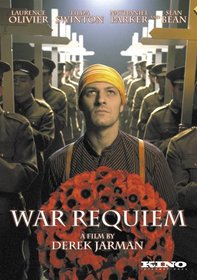| Actors: Laurence Olivier, Tilda Swinton, Sean Bean Director: Derek Jarman Genres: Indie & Art House, Drama, Kids & Family, Musicals & Performing Arts Sub-Genres: Indie & Art House, Drama, Kids & Family, Musicals & Performing Arts Studio: KINO INTERNATIONAL Format: DVD - Widescreen DVD Release Date: 09/02/2008 Release Year: 2008 Run Time: 1hr 32min Screens: Widescreen Number of Discs: 1 SwapaDVD Credits: 1 Total Copies: 0 Members Wishing: 7 MPAA Rating: Unrated Languages: English See Also: |
Search - War Requiem on DVD
  | War Requiem Actors: Laurence Olivier, Tilda Swinton, Sean Bean Director: Derek Jarman Genres: Indie & Art House, Drama, Kids & Family, Musicals & Performing Arts UR 2008 1hr 32min A stunning visual and serious music treat (Variety), Derek Jarman s (Sebastiane, Jubilee) 1989 War Requiem reunites British cinema s enfant terrible with his muse Tilda Swinton (2008 Oscar Winner for Michael Clayton) for a... more » |
Larger Image |
Movie DetailsSimilar Movies
|
Movie ReviewsBreathtaking film Jill | Jerusalem, Israel | 06/21/2008 (5 out of 5 stars) "After searching for this film for years, I have finally managed to see it. What a beautiful work! It's all in black and white, incorporating real footage from WWI, with only Laurence Olivier reading Wilfred Owen's superb poetry and Benjamin Britten's powerful music; there is no audible dialogue. This is a raging -- and yet, at times, delicate -- cry against war and all its terrible waste. In this last screen role, Olivier plays the Unknown Soldier. Nathaniel Parker -- conversely, in his first screen role -- plays the Soldier/Poet (Wilfred Owen) movingly. Tilda Swinton as the nurse is hauntingly lovely; and you'll also see Sean Bean as a German soldier, and Patricia Hayes as the British mother. Despite the subject matter and the footage, I found this an extremely poetic vision, and quite brilliant. It certainly takes more than one viewing to take it all in. Breathtaking! " An impressive visual to a great piece of music T. Fisher | 09/24/2009 (4 out of 5 stars) "This film version puts a visual to the 1963 recording of Benjamin Britten's War Requiem. The music is conducted by Britten, his partner Peter Pears sings the tenor lead, and it also features the German baritone Dietrich Fischer-Dieskau and the Russian soprano Galina Vishnevskaya. The nationality of the soloists was itself part of Britten's pacifist message in post-WWII Europe, and Britten's recording of the War Requiem is still considered at least one of the best versions ever recorded, if not the best.
The War Requiem combines the standard Latin text for a Catholic requiem mass with the English-language poetry of Wilfred Owen, who was serving in the British army when he was killed exactly one week before the end of World War I. His poems capture the senselessness and pain of war, particularly of the terrible trench warfare of the time. Derek Jarman has created a visual experience that respects and is true to the spirit of the music. Owen's poetry and Britten's music are both very expressive, providing opportunities for a strong visual narrative to communicate the tragedy of the music and the poetry on another dimension. One good example is in the Offertorium section, where Owen's powerful poetic imagery speculates that WWI was the result of the Biblical Abraham going ahead and in fact killing his son Isaac, despite the pleas of the angel to set him free. This is one scene that lends itself to an almost literal adaption. However, the majority of the visuals build on mood rather than concrete narrative. Taking its cue from Owen's poetry, the visuals are in a WWI setting. I thought the ending of the film was worthy of the amazing ending of the music. Tilda Swinton's performance -- wordless, like all performances in the film -- is stunning. An aged Sir Laurence Olivier makes an appearance as a modern-day (1980s) WWI veteran. Sean Bean, best known as "Boromir" in the Lord of the Rings trilogy, turns in a good performance as a German soldier. I only have one real complaint about the DVD. It should have captions. I found myself going to the internet and following along in the libretto on my laptop while watching, which detracted from the film experience. This could easily be remedied with subtitles. The film is definitely worth seeing, but I still believe the underlying music is more important than this film version. The music gets five stars, the film gets four, and the captionless DVD gets two. " |





